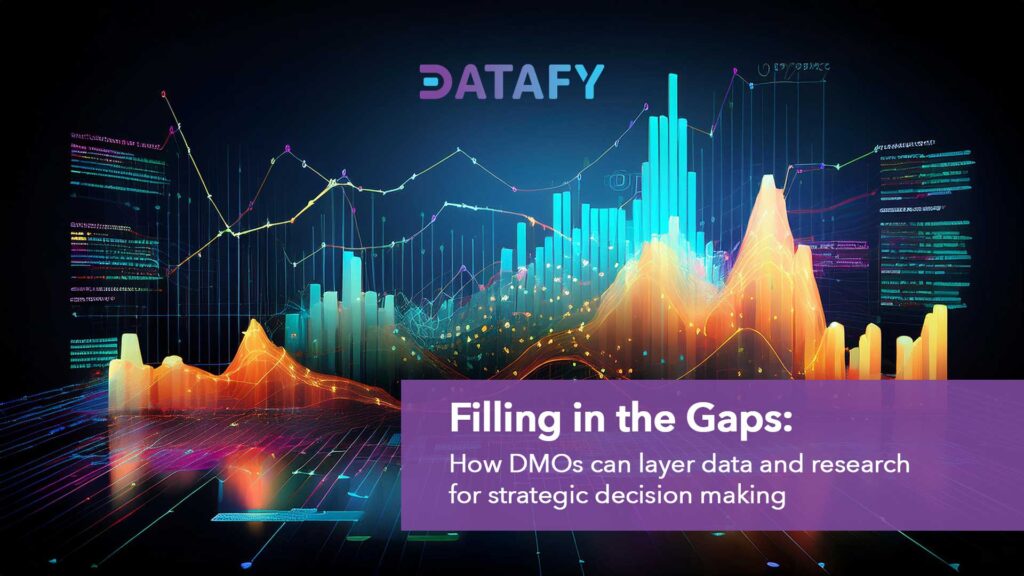September 20, 2024

Filling in the Gaps: How DMOs Can Layer Data and Research for Strategic Decision-Making
This post, shared by TTRA Partner Datafy, is based on insights from a recent webinar featuring research experts Anna Blount and David Reichbach. The session delved into how DMOs can effectively leverage data and research to enhance strategic decision-making and better understand visitor behavior.
Introduction:
Data and research play complementary, yet distinct roles – making them a powerful duo that can work together to help DMOs gather insights, fill gaps, make informed decisions, and ultimately support all aspects of an organization’s strategic decision-making.
Before we dive into how to make the most of them, let’s break down the differences between data, big data, and research – because they’re not the same thing.
Data vs. Big Data vs. Research
- Data: Data is data that you own. It is a complete data set with an exact number. (For example: Attraction ticket sales, retail point of sale, tax collection.)
- Big Data: Big data is, simply, lots of data. It is not a complete data set that will give you a finite number or answer – but it will allow you to model out beyond your immediate owned data. By collecting a huge amount of statistically significant data, big data allows you to model out, see the big picture, and uncover trends. (For example: Lodging data, geolocation data, and credit card spending.)
- Research: Research helps analyze elements that you cannot capture using data, such as consumer motivations, satisfaction, and the logic or thought behind decisions. It can be quantitative or qualitative. (For example: online surveys, intercept surveys, etc.)
How Do We Know What Data to Use?
Every DMO will have a different answer to this, because it depends entirely on your organization’s goals, strategies, and stakeholders. The key is: You have to use the data that is relevant to the question that you’re asking. And oftentimes, the real question will be, “What is the best combination of data points that will most efficiently tell this story?”
The truth is, no single data source will always be the perfect fit. Every data set has its strengths and limitations—questions it answers really well, and others that it doesn’t. Keeping this in mind is critical when deciding which data is right for your needs.
Give Me an Example
This is perhaps best illustrated by using the example of geolocation data. Geolocation data is an incredibly powerful tool and is tough to beat when it comes to things like understanding visitor behavior and demographics, uncovering trends, and tracking growth rates.
On the other hand, in spite of a widespread expectation that geolocation data can be a people counter, it really cannot. DMO marketers should be clear-eyed that – especially in light of the shifting privacy frameworks of the last few years – geolocation data should not be used to track footfall. (Especially if you are looking at a smaller point of interest.)
So, What Do You Really Want to Know?
- Do you want to know how many people attended an event? Use ticket sales data.
- Do you want to look into spending data during the event, or know where attendees visited while in-market for the event? You’ll want to dive into the geolocation data. (AKA big data.)
- Are you interested in knowing their motivation for coming to the event in the first place? Research is what you’re looking for.
In Conclusion
Herein lies the beauty of layering in different data sets and research: No one data set can answer the question that you’re asking 100% of the time, but when integrated, they can work together to fill the gaps.
“There is a huge value in integrating data and big data sources with research,” according to David Reichbach of Future Partners. “Every data set has limitations, but combining and integrating them allows us to paint a more complete picture of human behavior.”
Interested in hearing more insights like this? Catch the full conversation from Datafy’s most recent webinar. (Watch it here!)
About Datafy:
Analytics and ad-tech provider Datafy was the first-to-market in creating a full-circle solution that expertly incorporates analytics, advertising, and attribution, all in one place. By combining its industry-leading tools with a passionate, knowledgeable team, Datafy guides clients from strategy to execution to reporting, providing the insights and action needed to support its partners and their communities. For more information, visit www.Datafy.com.
